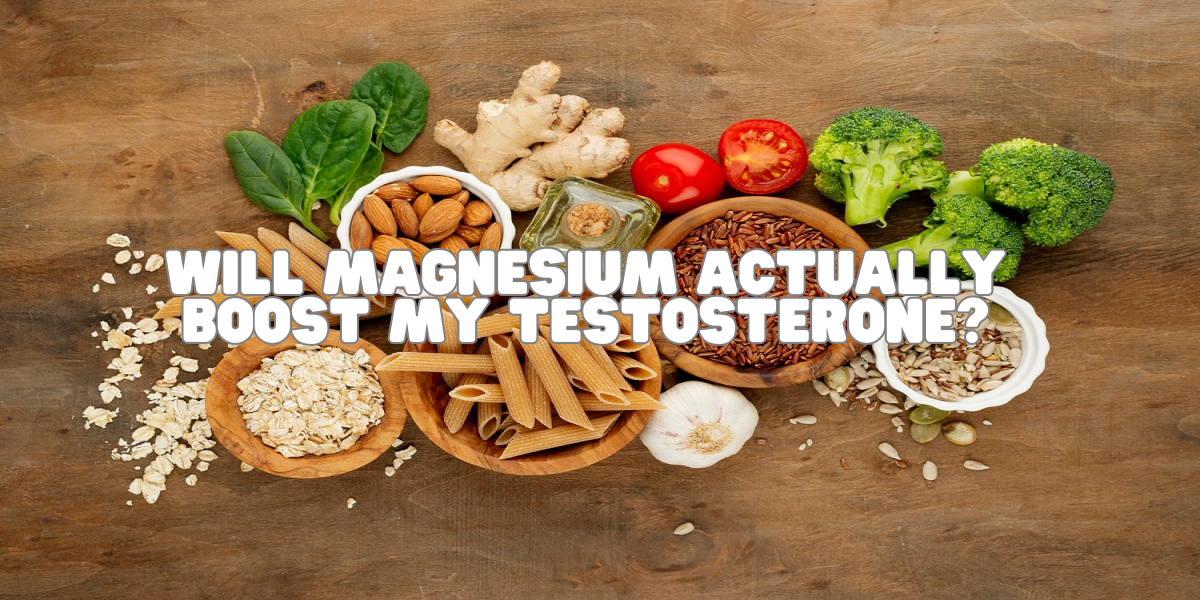Will Magnesium Boost Testosterone Levels? | Scientific Studies

Magnesium is believed to improve testosterone levels in men. In fact, among the wide range of benefits that it offers, some of the key ones like promoting muscle health and strength, improving sleep, and regulating blood sugar in the body are all ultimately connected to testosterone health. Magnesium, thus, is essential for all categories of men like fitness enthusiasts, men advancing in age, or those with sedentary lifestyles.
This article is all about how scientific studies and findings hold up to the fact that magnesium contributes to enhancing testosterone health.
Effects Of Magnesium On Testosterone
One of the major reasons for testosterone decline in men aside from aging and lifestyle choice is a deficiency of important nutrients in the body that aid its production and magnesium is one of them.
Magnesium status is directly impacted by the day-to-day diet and the recommended daily dose of this mineral is 400-420 mg. While adequate magnesium in the body can give a significant rise to testosterone levels, deficiency of this mineral can do vice versa. A study conducted in 2011 with a sample size of 455 men aged 65 and above found that magnesium intake positively impacts the secretion of anabolic hormones like total IGF-1 (insulin-like growth factor 1) and increases the free and total testosterone in the blood.
(IGF-1 is a hormone/ protein which helps in improving blood sugar metabolism thus increasing the body’s ability to synthesize testosterone.
Other studies have also found that with age magnesium concentration declines in men as the dietary magnesium does not get absorbed in the body completely. It then leads to low testosterone production resulting in weaker bones and muscles, low metabolism, and fatigue among other things.
Impact Of Magnesium On Athletes

As mentioned earlier, magnesium is an essential nutrient among different categories of men. Intake of magnesium supplements among athletes can make a prominent difference in testosterone levels when they combine it with physical exercises.
A study was conducted in 2011 with three groups of men at four different intervals- one resting before supplementation; one resting after supplementation; another with exhaustion (practicing 90-120 min/day) before taking magnesium supplement, and finally with exhaustion (practicing 90-120 min/day) after supplementation.
In the end, it was found that there was a rise in testosterone levels among men who had physical activities or fitness training as well as those who were in an inactive state. However, the increase in testosterone levels was more significant in athletes than those in a sedentary state.
Another study found that magnesium supplementation when combined with zinc supplements can enhance the production of testosterone more which in turn improves physical strength and athletic performance.
It is also important to note that magnesium levels can decline in athletes when they are involved in intense workout sessions. This can lead to muscle fatigue, reduced muscle movement, and quicker spasms due to insufficient oxygen absorption. However, the good thing is, proper supplementation of this mineral can bring up the levels quickly and increase the body’s endurance.
How Does Magnesium Help Improve Testosterone
A scientific study determined the mechanism of magnesium in the body which contributes to testosterone increase. To begin with, a blood protein called sex hormone binding globulin (SHBG) binds with nearly 70% of the testosterone, and about 28% of it gets attached to other cells. This means just about 2% of the hormone is bioavailable or ‘free’.
This is where magnesium comes into play. This mineral inhibits the SHBG’s ability to attach with the testosterone thus increasing the availability of free testosterone in the blood in men.
Conclusion
After going through various research studies and evidence, it can be concluded that magnesium supplementation does have a connection with testosterone concentrations. An abundant concentration of magnesium in the body can increase both free and total testosterone in the blood.
Healthy testosterone levels can then lead to various healthy changes in a man’s body like increasing strength, promoting muscle development, better mood, and increased athletic performance. This is precisely why most good-quality testosterone boosters have magnesium as one of their key ingredients.
